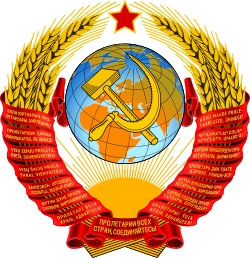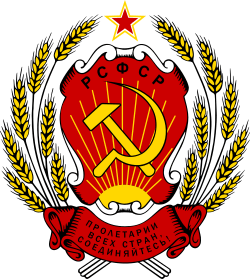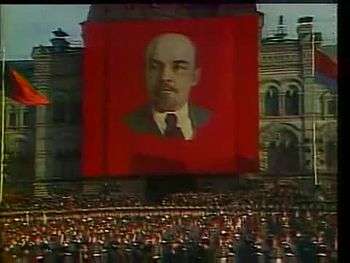State Anthem of the Soviet Union
| English: State Anthem of the USSR | |
|---|---|
  | |
|
State anthem of | |
| Lyrics | Gabriel El-Registan, Sergey Mikhalkov (BOI1943 and 1977) |
| Music | Alexander Alexandrov, 1938 (?) |
| Adopted |
1 January 1944 1 September 1977 (modified version) |
| Relinquished |
26 December 1991 (as anthem of the Soviet Union) 23 November 1990 (as anthem of the Russian SFSR) |
|
| |
| Music sample | |
| State Anthem of the USSR (instrumental) | |
Slav’sya, Otechestvo nashe svobodnoye! (Russian: Славься, Отечество наше свободное!; Slav’sya, Otechestvo nashe svobodnoye!, lit. "Be glorious, our free Fatherland!"), officially known as the "State Anthem of the Soviet Union" (Russian: Государственный гимн СССР, tr. Gosudarstvenny Gimn SSSR) was introduced during World War II on 15 March 1944, replacing The Internationale as the official anthem of the Soviet Union and the Russian Soviet Federative Socialist Republic. The lyrics were written by Sergey Mikhalkov (1913–2009) in collaboration with Gabriel El-Registan (1899–1945) and the music was composed by Alexander Alexandrov (1883–1946). Although the Soviet Union was dissolved in 1991, its national anthem's melody continues to be used in the Russian Federation's national anthem, which has lyrics different from the Soviet one.
History

 |
Vocal (1944 lyrics)
By the Red Army Ensemble Instrumental (1955)
|
| Problems playing these files? See media help. | |
The Anthem of the Soviet Union was played for the first time on the Soviet radio at midnight on 1 January 1944.[1] The 1944 lyrics had three different refrains following three different stanzas; in each refrain, the second line was consequently modified with references to friendship, then happiness and finally to glory. Joseph Stalin and the Soviet Union's war against Nazi Germany were originally invoked in the lyrics.
With the process of de-Stalinization inaugurated after Stalin's death, the lyrics which referred to Stalin were considered unacceptable and during 1953–1977 the anthem was performed without lyrics.[2] A notable exception took place at the 1976 Canada Cup ice hockey tournament, where the singer Roger Doucet insisted on performing the anthem with lyrics, after consultations with Russian studies scholars from Université de Montréal and the Soviet team officials.[3][4] In 1977, to coincide with the 60th anniversary of the October Revolution, revised lyrics, earlier written in 1970 by the original author Sergey Mikhalkov,[5] were adopted. The varying refrains were replaced by a uniform refrain following all stanzas; the line praising Stalin was dropped, as were the lines referring to the Great Patriotic War.
Use in the Russian Federation
After the dissolution of the Soviet Union in 1991, the Russian Federation adopted a new wordless anthem called the "Patriotic Song", although there were suggestions for adopting lyrics. As a result, a few different versions were produced.[6] In 2000, the "National Anthem of Russia" was introduced, which used the music of the Soviet national anthem and the lyrics written by Sergey Mikhalkov.
The Soviet anthem remains for many a song of national pride and of international unity with former Union republics. It is often played at Communist rallies and apolitical Victory Day celebrations.
In the summer of 2012, at an MMA competition in St. Petersburg, which Russian Federation President Vladimir Putin attended, American fighter Jeff Monson entered the arena with the Soviet anthem being played as his entry song; Russian President Putin and the entire audience stood up for the anthem.[7]
State Union of Russia and Belarus
Also, the same music was used for a proposal of the anthem of the State Union of Russia and Belarus entitled Derzhavny Soyuz Narodov (Union of Sovereign Nations). Although never officially adopted, the lyrics of that piece were not tied to any specific nationality, and could be adopted for a broader union. However, there appears to be no plans to utilize that piece in any official role. The anthem also had official versions in the languages of every Soviet republic and in several other Soviet languages.
Decommunization
In some post-Soviet states which adopted decommunization laws banning the Communist symbolism, performing the Soviet anthem is illegal. For example, since 2015 in Ukraine the offenders face up to five years of prison.[8] Similar laws were adopted in Latvia[9] and Lithuania.[10]
Lyrics
| Lyrics for the 1944 version | ||||
|---|---|---|---|---|
| Russian | Transliteration | Official translation | Literal translation | Paul Robeson translation[11] |
|
Союз нерушимый республик свободных
Сквозь грозы сияло нам солнце свободы,
Мы армию нашу растили в сраженьях.
|
Soyuz nerushimy respublik svobodnykh
Skvoz’ grozy siyalo nam solntse svobody,
My armiyu nashu rastili v srazhen’yah,
|
|
An unbreakable union of free republics,
Through tempests the sun of freedom shone to us,
We grew our army in battles,
|
United forever in friendship and labor,
Through days dark and stormy where great Lenin led us
We fought for the future, destroyed the invader,
|
| Lyrics for the 1977 version | |||||
|---|---|---|---|---|---|
| Russian | Transliteration | Lithuanian | Literal translation | Phonetic transcription | Official CPSU translation [12] |
|
Союз нерушимый республик свободных
Сквозь грозы сияло нам солнце свободы,
В победе бессмертных идей Коммунизма
|
Soyuz nerushimy respublik svobodnykh
Skvoz’ grozy siyalo nam solntse svobody,
V pobede bessmertnyh idey Kommunizma
|
Laisvųjų respublikų sąjunga amžiams
Per audrą mums laisvė lyg saulė žėrėjo,
Laimėsim, taurių komunizmo idėjų
|
A union that's unbreakable, of free republics,
Through tempests the sun of freedom shone to us,
In the victory of the immortal ideas of Communism
|
sɐˈjus nʲɪ.ruˈʂɨ.mɨj rʲɪsˈpub.lʲɪk svɐˈbod.nɨx |
skvəzʲ‿ˈɡro.zɨ sʲɪˈja.lɐ nam ˈson.t͡sɪ svɐˈbo.dɨ
f‿pɐˈbʲe.dʲɪ bʲɪˈsmʲɛrt.nɨx ɪˈdʲej kə.muˈnʲiz.mə
|
|
See also
- God Save the Tsar!
- Grom pobedy, razdavajsya! ("Let the thunder of victory sound!")
- National anthem of Russia
- Patrioticheskaya Pesnya ("Patriotic Song")
- The Internationale
- Worker's Marseillaise, Russian version of La Marseillaise
References
- ↑ "Гимн СССР (1943)".
- ↑ Sputnik. "Russia Marks Soviet Poet Mikhalkov's 100th Anniversary".
- ↑ Morse, Eric (9 September 2009). "The Cold War on ice". canada.com. Archived from the original on 2015-04-02.
- ↑ "How Roger Doucet Wrote the Soviet National Anthem".
- ↑ Голованова, М. П.; В. С. Шергин (2003). Государственные символы России. Москва: Росмэн-Пресс. p. 150. ISBN 5-353-01286-0.
- ↑ II. Связанные с гимном Глинки Archived May 8, 2008, at the Wayback Machine.
- ↑ M-1 Global (26 November 2012). "Джефф Монсон vs. Денис Комкин, mma video HD" – via YouTube.
- ↑ "За гимн СССР - 5 лет тюрьмы: декоммунизация в цифрах и фактах".
- ↑ "Latvia Bans Soviet, Nazi Symbols"
- ↑ "BBC NEWS - Europe - Lithuanian ban on Soviet symbols".
- ↑ Сайт Флаг России - Музыка - Государственный гимн СССР (1944-1977) на английском языке (in Russian). 23 September 2011. Retrieved 18 August 2012.
- ↑ Vitalyk (3 June 2006). "Unbreakable Union of Freeborn Republics!".
External links
| Wikisource has lyrics in other languages at: |
- Russian Anthems museum – extensive set of downloadable recordings and official sheet music.
- 20 Most popular Soviet songs
- The author of Russian national anthem: sources of the USSR's anthem in Russian.
- by K.Kovalev – Eng. Bortniansky's anthem "Kol slaven" - Eng.
- Vocal performance of the National Anthem of the Soviet Union with Subtitles on YouTube
- As presented by Central Television in 1984 on YouTube
